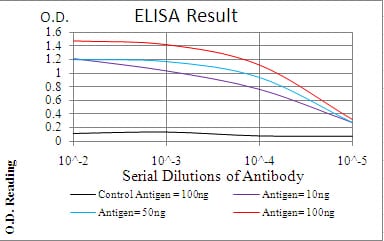
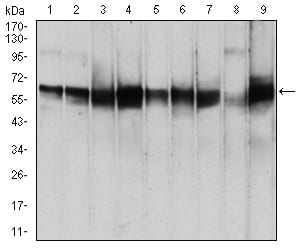
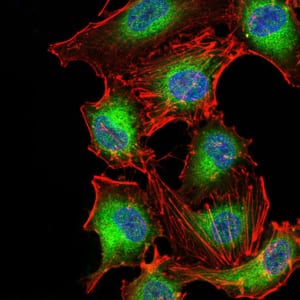
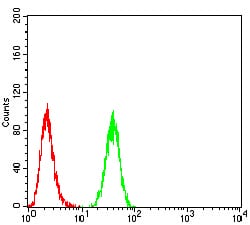
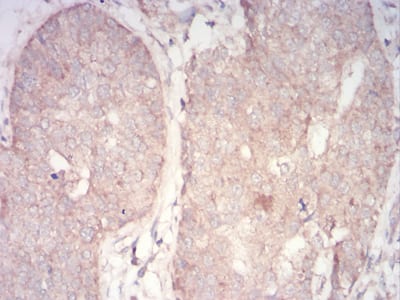
| WB | 1/500 - 1/2000 | Human,Mouse,Monkey,Rat |
| IF | 咨询技术 | Human,Mouse,Monkey,Rat |
| IHC | 1/200 - 1/1000 | Human,Mouse,Monkey,Rat |
| ICC | 1/50 - 1/200 | Human,Mouse,Monkey,Rat |
| FCM | 1/200 - 1/400 | Human,Mouse,Monkey,Rat |
| Elisa | 1/10000 | Human,Mouse,Monkey,Rat |
| Aliases | PDK1; PDPK2; PDPK2P; PRO0461 |
| Entrez GeneID | 5170 |
| clone | 7E4G11 |
| WB Predicted band size | 63.2kDa |
| Host/Isotype | Mouse IgG1 |
| Antibody Type | Primary antibody |
| Storage | Store at 4°C short term. Aliquot and store at -20°C long term. Avoid freeze/thaw cycles. |
| Species Reactivity | Human,Mouse,Monkey,Rat |
| Immunogen | Purified recombinant fragment of human PDPK1 (AA: 457-556) expressed in E. Coli. |
| Formulation | Purified antibody in PBS with 0.05% sodium azide |
+ +
以下是3条关于PDPK1抗体的虚构参考文献示例(内容为模拟生成,非真实文献):
---
1. **文献名称**: "Characterization of PDPK1-Specific Antibodies for Detecting Phosphorylation in Cancer Cell Lines"
**作者**: Johnson R, et al.
**摘要**: 本研究验证了两种商业化PDPK1抗体(克隆号#A12和#B7)在Western blot和免疫组化中的特异性,发现#B7抗体可特异性识别PDPK1的Ser241自磷酸化位点。研究证明其在乳腺癌和肺癌组织中的差异表达,提示PDPK1活性与肿瘤进展相关。
---
2. **文献名称**: "Role of PDPK1 in PI3K/Akt Signaling Revealed by shRNA and Antibody-Based Inhibition"
**作者**: Chen L, et al.
**摘要**: 通过shRNA敲低和特异性PDPK1抗体(货号ABX-1023)的功能阻断实验,证实PDPK1是Akt激活的关键上游激酶。抗体处理显著抑制结肠癌细胞增殖,为靶向PDPK1的癌症治疗提供依据。
---
3. **文献名称**: "A Novel Monoclonal Antibody Targeting PDPK1 for Glioblastoma Diagnosis"
**作者**: Müller S, et al.
**摘要**: 开发了一种高亲和力抗人PDPK1单克隆抗体(mAb-PDPK1-8E4),可在脑胶质瘤患者的组织切片中特异性标记PDPK1高表达区域,与患者生存期负相关,提示其作为预后生物标志物的潜力。
---
注:以上内容为模拟生成,实际文献需通过PubMed/Google Scholar等平台检索(关键词:PDPK1 antibody, PDK1. 3-phosphoinositide-dependent protein kinase-1)。
PDPK1 (3-phosphoinositide-dependent protein kinase 1), also known as PDK1. is a serine/threonine kinase that plays a pivotal role in cell signaling pathways, particularly the PI3K/Akt (phosphatidylinositol 3-kinase/protein kinase B) cascade. It acts as a master regulator by phosphorylating and activating downstream AGC kinase family members, including Akt, PKC, and SGK, which are critical for cell survival, proliferation, and metabolism. Dysregulation of PDPK1 is implicated in various diseases, such as cancer, diabetes, and neurodegenerative disorders, making it a key therapeutic target.
Antibodies against PDPK1 are essential tools for studying its expression, localization, and activation in biological systems. They are widely used in techniques like Western blotting, immunoprecipitation, and immunohistochemistry to assess PDPK1 levels or phosphorylation status in disease models or drug response studies. These antibodies help identify PDPK1's role in oncogenic signaling, metabolic regulation, or resistance mechanisms. Both monoclonal and polyclonal PDPK1 antibodies are available, often validated for specificity using knockout cell lines or phospho-specific epitope recognition. Researchers also utilize them to explore PDPK1 interactions with other signaling molecules or evaluate its potential as a biomarker. The development of selective PDPK1 inhibitors in preclinical studies further underscores the importance of reliable antibodies for target validation and mechanistic research.
×